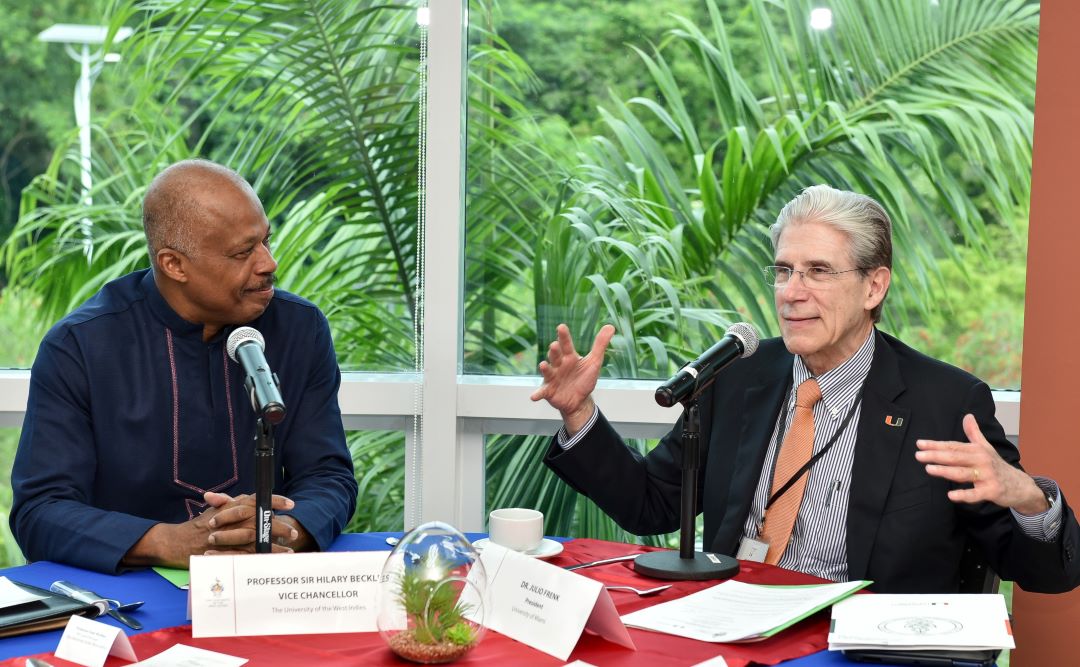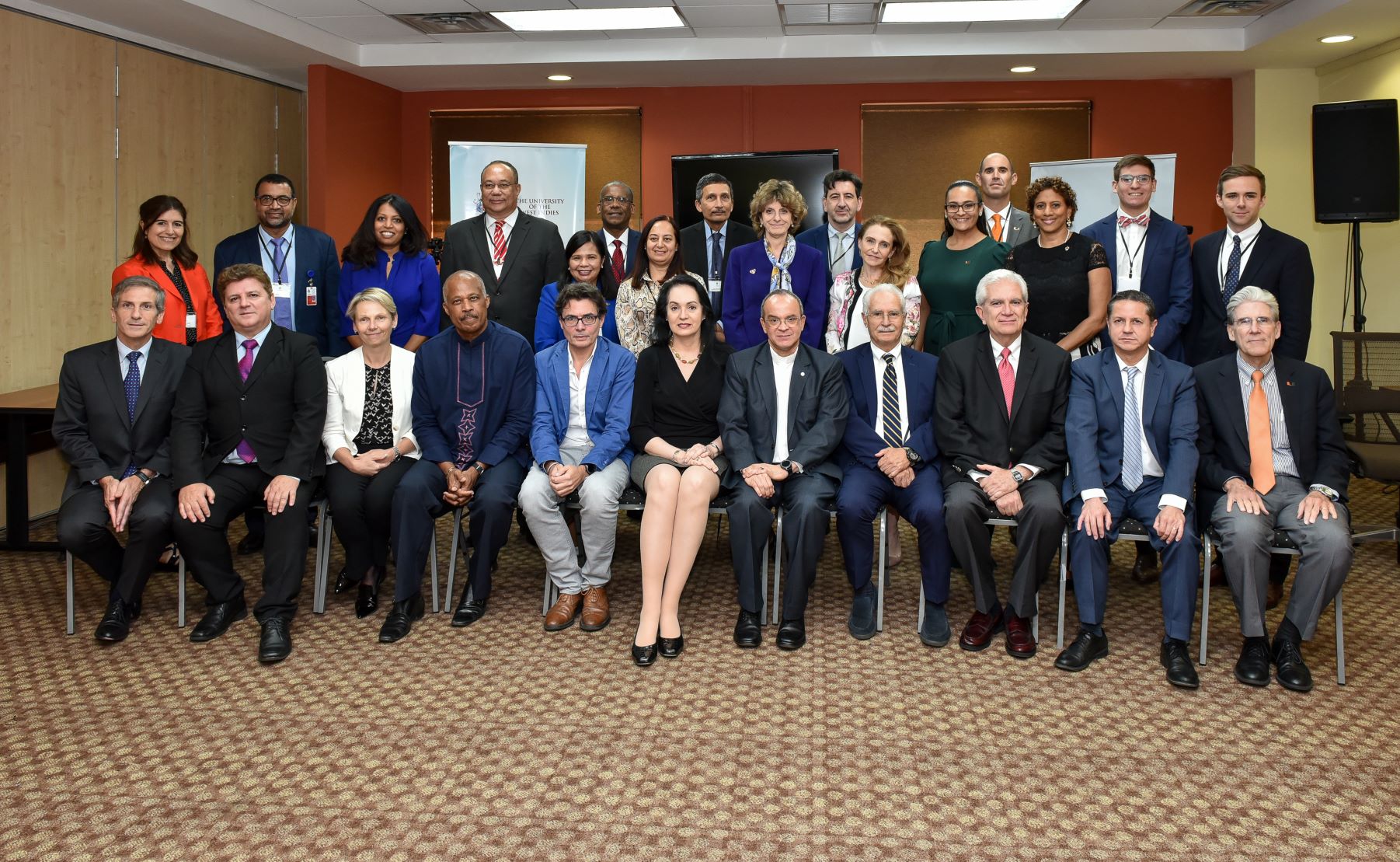News Releases
University of Miami and The UWI Partner for Hemisphere
For Release Upon Receipt - November 15, 2019
UWI
The University of the West Indies (The UWI) and the University of Miami (UM) have teamed up as partners within in a Hemispheric University Consortium (HUC). The second meeting of the Consortium was held at The UWI’s Regional Headquarters in Jamaica, in October and co-chaired by Vice-Chancellor, Professor Sir Hilary Beckles and Dr Julio Frenk, President of the University of Miami.
A year ago, Dr Julio Frenk reached out to Professor Sir Hilary Beckles—among other University presidents—with a visionary idea for the Consortium and since then the two have been working steadfastly to bring the project to maturity. Details of the Consortium’s governance were ironed out and agreed to in a Memorandum of Understanding (MOU), signed during the meeting.
The HUC comprises 14 universities across Latin America, the Caribbean, Canada, and the United States. Partnerships such as this Consortium are imperative to tackle some of the hemisphere’s most pressing problems, such as public health, climate change, sustainability and resilience issues. HUC Member universities are pursuing a higher level of integration and, with a spirit of co-operation, have agreed to share knowledge, discovery, and understanding.
Vice-Chancellor Beckles described The UWI as a prime example of inter-governmental collaboration and reiterated the institution’s commitment to the HUC. He said, “The University of the West Indies is deeply committed to this consortium. We are passionately committed to it because we believe it is a very relevant strategy and effective tool to enable universities across this hemisphere to collaborate in partnership in the search for solutions that will be of a regional and hemispheric nature. This project to which we are committed is one of the many institutions we believe shows very effectively our commitment of higher education to finding sustainable solutions to the problems facing our people across this hemisphere and to recognise that many of these challenges cannot be met on a singular basis, cannot be met on a national basis, but can only be met on a hemispheric and regional basis.”
Meanwhile, Dr Frenk termed the consortium, formally established in 2018, as “a unique mechanism for collaboration across the hemisphere based upon the principles of equality, free exchange, mutual responsibility and mutual accountability for the activities of the consortium.” He noted that, “the consortium has already proven to be a very active platform for connecting institutions with a like-minded focus on creating knowledge and stimulating exchange around that knowledge on some of the most important consequential problems faced by our region and by the entire planet.”
The consortium agreement commits signatories to share academic and infrastructure resources and collaborate in addressing the challenges facing universities and global society, through a range of broad and dynamic key thematic areas with priority given to “human prosperity and well-being” and “climate change, sustainability and resilience”.
Twelve of the fourteen member universities present on this occasion and signing the MOU were: Universidad Austral (Argentina); Universidade de São Paulo (Brazil); York University (Canada); The University of the West Indies (Caribbean); Pontificia Universidad Católica de Chile (Chile); Universidad de los Andes (Colombia); Universidad de Costa Rica (Costa Rica); Pontificia Universidad Católica Madre y Maestra (República Dominicana); Universidad San Francisco de Quito (Ecuador); Tecnológico de Monterrey (México); Universidad de las Américas Puebla (México); and University of Miami (United States).
The Latin-American Caribbean Centre (LACC), led by Ambassador Gillian Bristol—which coordinates The UWI’s participation within the Consortium—organised the day’s events.
END
Notes to the Editor
Photo captions
 1. Vice-Chancellor of The UWI, Professor Sir Hilary Beckles and President of the University of Miami, Dr Julio Frenk in conversation during the second meeting of the Hemispheric University Consortium (HUC) held at The UWI’s Regional Headquarters in Jamaica in October.
1. Vice-Chancellor of The UWI, Professor Sir Hilary Beckles and President of the University of Miami, Dr Julio Frenk in conversation during the second meeting of the Hemispheric University Consortium (HUC) held at The UWI’s Regional Headquarters in Jamaica in October.
 2. Group photo of University Presidents who attended the second meeting of the Hemispheric University Consortium (HUC) held at The UWI’s Regional Headquarters in Jamaica in October. Front row: fourth from left is Vice-Chancellor of The UWI, Professor Sir Hilary Beckles and right, end is President of the University of Miami, Dr Julio Frenk.
2. Group photo of University Presidents who attended the second meeting of the Hemispheric University Consortium (HUC) held at The UWI’s Regional Headquarters in Jamaica in October. Front row: fourth from left is Vice-Chancellor of The UWI, Professor Sir Hilary Beckles and right, end is President of the University of Miami, Dr Julio Frenk.
Related News
The UWI and University of Miami sign MOU to formalise partnership
About The UWI
For over 70 years The University of the West Indies (The UWI) has provided service and leadership to the Caribbean region and wider world. The UWI has evolved from a university college of London in Jamaica with 33 medical students in 1948 to an internationally respected, regional university with near 50,000 students and five campuses: Mona in Jamaica, St. Augustine in Trinidad and Tobago, Cave Hill in Barbados, Five Islands in Antigua and Barbuda and an Open Campus. As part of its robust globalization agenda, The UWI has established partnering centres with universities in North America, Latin America, Asia, and Africa including the State University of New York (SUNY)-UWI Center for Leadership and Sustainable Development; the Canada-Caribbean Studies Institute with Brock University; the Strategic Alliance for Hemispheric Development with Universidad de los Andes (UNIANDES); the UWI-China Institute of Information Technology, the University of Lagos (UNILAG)-UWI Institute of African and Diaspora Studies and the Institute for Global African Affairs with the University of Johannesburg (UJ). The UWI offers over 800 certificate, diploma, undergraduate and postgraduate degree options in Food & Agriculture, Engineering, Humanities & Education, Law, Medical Sciences, Science & Technology, Social Sciences and Sport.
As the region’s premier research academy, The UWI’s foremost objective is driving the growth and development of the regional economy. The world’s most reputable ranking agency, Times Higher Education, has ranked The UWI among the top 600 universities in the world for 2019 and 2020, and the 40 best universities in Latin America and the Caribbean for 2018 and 2019. The UWI has been the only Caribbean-based university to make the prestigious lists. For more, visit www.uwi.edu.
Contact
Marketing and Communications Department
- Tel.: (868)-662-2002 ext.2013/2014
- Email: marketing.communications@sta.uwi.edu

